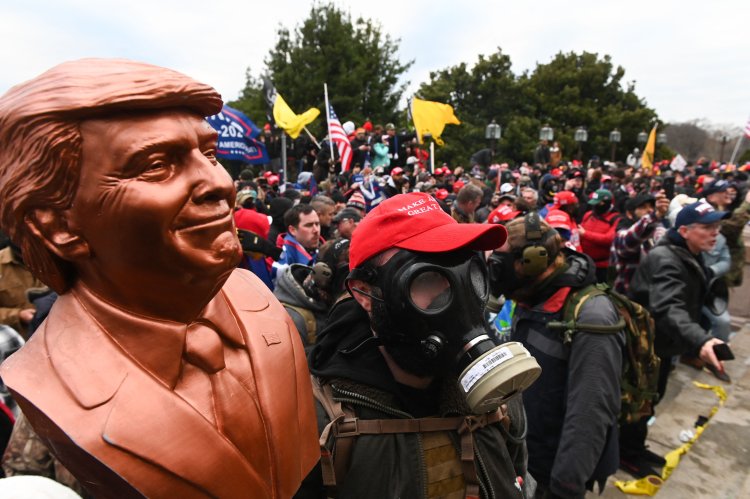Ed Martin Referred to Jan. 6 as ‘Mardi Gras.’ Now, He's Attempting to Incarcerate a Man for a Peaceful Protest.
The significance of January 6 is magnified in the legal proceedings involving a nonviolent protester.

This case is being managed by interim U.S. Attorney Ed Martin, a Trump supporter known for representing Jan. 6 defendants and referring to that day as “Mardi Gras in D.C.” Upon assuming office, Martin quickly demoted veteran prosecutors who were handling Jan. 6 cases, a decision that has recently put his nomination at risk.
The prosecution is becoming a litmus test for whether Trump's pardons have granted new legal defenses for those arrested during demonstrations in Washington. A group of six attorneys, familiar with both sides of protest arrests, suggested that the legacy of Jan. 6 is likely to influence future court proceedings and juror perceptions. Eidinger's attorney, Robert Haferd, pointedly remarked, “Why is this harmless, conscientious, respectful, nonviolent, organized demonstration being prosecuted seeking a conviction when, on the other hand, other violent, disgraceful mob-style vigilantism is being pardoned?”
The details of the case reveal a surprisingly tame situation: Adam Eidinger, a veteran activist, was part of a group that protested on the steps of the National Archives on January 10, using ladders to display a 40-foot banner calling on then-President Joe Biden to recognize the Equal Rights Amendment. When police arrived, six demonstrators were arrested for unlawful entry—an offense similar to that faced by 95 percent of those involved on Jan. 6. Importantly, these arrests occurred without any violence, as Eidinger noted: “I followed all orders” from law enforcement. There were no weapons or altercations involved.
In a city still marked by the chaos created by a pro-Trump mob attacking law enforcement and vandalizing the Capitol, this incident appears minor. Shortly after, the banner was removed, and life returned to normal. If Jan. 6 was akin to a festive occasion, the Archives protest resembled “a sleepy Sunday morning in Lent.”
Yet, while the rioters face no repercussions, Eidinger must now contend with the threat of jail time for his significantly less disruptive action, conducted just blocks away. In a surprising turn, Martin’s office allowed other arrested participants to accept deferred-prosecution deals, which typically lead to dismissed charges, but Eidinger, who has a history of protests and civil disobedience arrests, was not granted the same option and is set to stand trial in October.
“It doesn’t seem fair on multiple levels,” Eidinger remarked. “I’m a peaceful demonstrator, I haven’t been violent ever, and I wasn’t even the one hanging the banner. Just because you’re in the presence of a demonstration doesn’t mean you’re criminally liable for what others are doing. I find it ironic that the guy who made the same argument on behalf of so many people is now pursuing the case against me.”
The U.S. Attorney’s office has not commented on Eidinger’s case or on whether Martin’s handling of Jan. 6 could complicate the prosecution.
Martin’s nomination faces challenges, as he must be confirmed by the Senate before May 20. Recent weeks have seen scrutiny of his short tenure, with Senate Democrats calling for hearings to address various controversies surrounding him. Recently, North Carolina Republican Senator Thom Tillis announced he would not support Martin's nomination, citing the events of January 6.
The influence of the Jan. 6 pardons on subsequent criminal prosecutions is likely to remain a prominent topic, particularly for individuals like Eidinger, a dedicated activist with a long history of engaging in issues from marijuana decriminalization to opposing public stadium funding. As long as protests persist in Washington, individuals will be arrested, and those facing trials may find the context of recent pardons to be a critical part of their defense.
Mara Verheyden-Hilliard, an attorney who has long advocated for free speech and activist causes in Washington, articulated a concerning reality: “There are those in higher levels of law enforcement authority who are celebrating and countenancing and supporting a violent attack on the Capitol, and have no problem with that, and yet wish to bring the entire force of the state to bear on nonviolent protesters.”
Alyse Adamson, a former D.C. prosecutor, expressed that she anticipated attempts from prosecutors to keep references to Jan. 6 out of the courtroom, arguing that doing so could inflame juror emotions. Yet, she indicated that defense lawyers would likely emphasize the contrasting treatment between rioters and nonviolent demonstrators in pretrial motions. “I would say, ‘Your honor… why is my client not being treated the same?’”
Even if a judge bars references to the insurrection during proceedings, the memories of that day are indelible. A clever attorney could leverage these sentiments without explicitly invoking Trump’s pardons or Martin’s remarks about Jan. 6. Adamson noted, “There are ways to present this case that will allow the jury to see those parallels,” emphasizing the potential for a skilled defense to invoke jury nullification.
Adamson, who has experience at the U.S. Attorney’s office, perceived jury nullification as a troubling outcome that might emerge from the fallout of the Jan. 6 events. These developments complicate the prosecution of individuals for seemingly less significant actions, such as holding an ERA banner at the Archives.
Currently, instances of protest-related arrests are few; D.C.’s Metropolitan Police Department estimates around two dozen such arrests in the current year, while the U.S. Capitol Police document several hundred annually for charges generally related to obstruction. Most of these cases result in “post and forfeit” situations, which function like tickets with no further action.
Eidinger stated he would have preferred the deferred prosecution option extended to his fellow protestors, and he is now apprehensive about the potential six-month jail sentence if convicted.
However, he expressed satisfaction with the protest's outcome, revealing that shortly thereafter, Biden recognized that the ERA had indeed been ratified by enough states to qualify as the 28th Amendment—a position at odds with the current Trump administration’s interpretation, suggesting that the legal dispute may eventually require court intervention.
In an ironic twist, Martin's political journey began as an aide to conservative activist Phyllis Schlafly, who famously opposed the amendment in the 1970s.
“I have never been involved in a demonstration that had such a response from the White House,” Eidinger reflected. “It’s taken over 100 years to get this amendment in. We’re part of the story now.”
Debra A Smith for TROIB News












